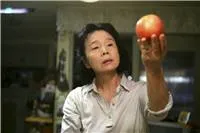Review: Poetry
Written by

Reviewed by Simon Zhou
Poetry
Dir. Lee Chang-Dong
Unwashed dishes as a metaphor in a poem is a cliché; the poetry of living is not. In director Lee Chang-Dong’s own words, ‘What does it mean to be writing poetry when prospects of an ongoing future seem dismal?’
Lee’s latest feature film, elusively titled Poetry, is about dissolution. It follows an elderly woman, Yang Muji who has assumed care of her adolescent grandson, and the burden that is thrust upon her when it comes to light that her grandson has done something cruel and possibly unforgiveable. More disparate than Lee’s previous films, there is a preponderance for pluralities; small moments that do not sit easily with the main narrative throughline or a simple causal logic.
Varying his usual documentary handheld style with fluid tripod work, characters act as they do in life – foolishly, irrationally, and often contradictorily. When, upon Muji’s discovery of her grandson’s transgression, she does not immediately confront him, we ask why, but we do not question its authenticity. The performances are universally exceptional, as has come to be expected with Lee’s films; and of particular note to older Korean audiences is the presence of Yun Junghee, voted in a poll as the greatest actress in Korean cinema, and making her return after a fifteen year absence from screen.
As with Lee’s other films, there is a struggle between social etiquette and social conditioning in how one is supposed to behave, and the character’s inherent sense of right and wrong. In this film; this inherent sense of what is good – takes the form of involuntary action, much like a woman suffering from Tourettes syndrome. It is a deeply human work, and in its devotion to cinematic truth, refuses simple catharsis. The film does not judge any of its characters, presenting them simply, and without assumption. Joy, sorrow, and pity become mixed with resigned despair in the search for morality.
An insight into the film comes from the aforementioned quote by the director, and helps to tie together some of its threads. The role of art; not high mannerism, but the necessity to express meaning in the mundane, in the everyday – and also in the unbearable, is at the centre of Lee’s examination of the human condition. The reason to write, or not; the relevance, the need for art itself, on the most intimate, personal level, in the life of a woman that is disarray – this is at the centre of the film. It is poetry that allows us to live.
At times, the film is perhaps too subtle in its message; the circularities and paralleling echoes in the structure (between Muji and a teenage girl, Heejin, who centres the narrative of the film) a little too obscure to resonate fully. Despite this, there are moments in the film which are profoundly moving, and it is to the credit of the film that it never settles for easy answers. Like the indifferent flow of a river, it is impossible to grasp. Lee seems to deliberately leave a space, an absence for the audience to find its own meanings. It is a rarity in cinema deserves to be praised.